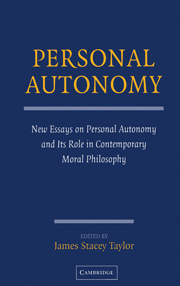Book contents
- Frontmatter
- Contents
- List of Contributors
- Acknowledgments
- Introduction
- PART I THEORETICAL APPROACHES TO PERSONAL AUTONOMY
- PART II AUTONOMY, FREEDOM, AND MORAL RESPONSIBILITY
- PART III THE EXPANDING ROLE OF PERSONAL AUTONOMY
- 12 Procedural Autonomy and Liberal Legitimacy
- 13 The Concept of Autonomy in Bioethics: An Unwarranted Fall from Grace
- 14 Who Deserves Autonomy, and Whose Autonomy Deserves Respect?
- 15 Autonomy, Diminished Life, and the Threshold for Use
- Index
15 - Autonomy, Diminished Life, and the Threshold for Use
Published online by Cambridge University Press: 03 December 2009
- Frontmatter
- Contents
- List of Contributors
- Acknowledgments
- Introduction
- PART I THEORETICAL APPROACHES TO PERSONAL AUTONOMY
- PART II AUTONOMY, FREEDOM, AND MORAL RESPONSIBILITY
- PART III THE EXPANDING ROLE OF PERSONAL AUTONOMY
- 12 Procedural Autonomy and Liberal Legitimacy
- 13 The Concept of Autonomy in Bioethics: An Unwarranted Fall from Grace
- 14 Who Deserves Autonomy, and Whose Autonomy Deserves Respect?
- 15 Autonomy, Diminished Life, and the Threshold for Use
- Index
Summary
THE EXPOSURE OF THE NONAUTONOMOUS
Normative ethical theories today place enormous stress upon autonomy or agency and treat it as of the utmost significance to the value of human life. Some theorists understand agency as referring to personhood or to moral personality; some take it to involve such things as rationality and action upon reasons, self-awareness, self-critical control of one's desires, the application of norms to conduct, and deliberative choice. Some take it to be about making one's own decisions (in the important affairs of life) and directing one's life or about constructing a life of value for oneself or about adopting and living out a life plan or rational plan of action. On all these views, the effect is to set up agents or autonomous beings as a special or privileged class, against which the lives of nonautonomous beings – such as infants, young children, the irreversibly comatose or those in a permanently vegetative state, those suffering from senile dementia, the severely mentally enfeebled, some of the brain damaged, and animals – are assessed and valued. So privileged is this class that all kinds of notions are invented or assumed – such things as impaired autonomy, potential autonomy, interrupted capacity, unrealized capacity, trusteeship, and proxy agency come to mind – by which to try to squeeze as many beings as possible into it. The fear, obviously, is that, if some human being falls outside the privileged class, the protections that normally extend to one morally may possibly be in doubt.
- Type
- Chapter
- Information
- Personal AutonomyNew Essays on Personal Autonomy and its Role in Contemporary Moral Philosophy, pp. 330 - 346Publisher: Cambridge University PressPrint publication year: 2005
- 3
- Cited by

